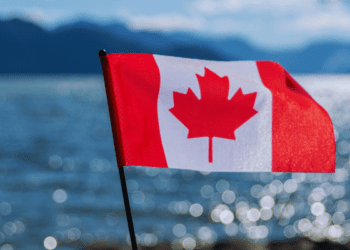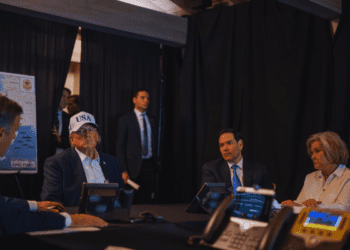November 28, 2011 – In his new column for The Hill Times, MLI Managing Director Brian Lee Crowley discusses the inability of the American political class to tackle their fiscal challenges. He points out two vital differences between Canada and the U.S. that help explain why Canada was able to tackle its fiscal challenges in the 1990s, while the U.S. is still struggling to tackle its fiscal problems now. He said, “The first is that our political class put partisan rancor and obduracy aside in pursuit of the national interest…The second factor that distinguishes our situation from the Americans’ is the influence of money in politics.” Read the full column below:
U.S. Congress can’t find way out of fiscal purgatory
This inability of the American political class to tackle an issue that transcends party, but strikes at the heart of America’s national interest is the defining issue of the day
By Brian Lee Crowley, The Hill Times, November 28, 2011
OTTAWA—The collapse of Congress’s Super Committee signals another failure by the Americans to find a path out of the fiscal purgatory to which decades of irresponsible policies have condemned them. Democrats and Republicans bear equal responsibility for this failure, as they do for the cumulative failure of imagination and leadership that has landed America in this mess.
This inability of the American political class to tackle an issue that transcends party, but strikes at the heart of America’s national interest is the defining issue of the day. And it makes the lessons of Canada’s landmark fiscal reforms of the 1990s all the more pressing and relevant for Americans, despite their legendary resistance to the idea that other countries have anything to teach the country that invented the term exceptionalism. After all, the circumstances Canada faced when Paul Martin brought down the 1995 budget were in many ways remarkably similar to the situation of America today.
If you spend a lot of time, as I do, talking to Americans about Canada’s reforms, one reaction predominates: there must be some obscure, but vitally important trait or factor that distinguishes the Canadian experience from the American and explains why we succeeded in fixing our fiscal juggernaut while they cannot.
The usual explanations are things like Canada “has oil” (as if they don’t), or we “devalued” our currency, or we have Parliamentary government that makes hard decisions easier to push through. Gently explain why each of these explanations is either fallacious or its influence highly exaggerated and they simply move down the list of things that might relieve them of responsibility for their continued crisis of public finances.
For what it is worth, I believe that there are two such factors, two vital differences between Canada and the U.S., that do explain much of our relative success, but I have yet to hear them mentioned by an American audience.
The first is that our political class put partisan rancor and obduracy aside in pursuit of the national interest. It is often forgotten today, but the first government that tackled its dire fiscal position in Canada at the time was neither the Liberals in Ottawa nor the Tories in Alberta or Ontario. It was Roy Romanow’s NDP in Saskatchewan.
Ralph Klein’s Alberta Tories were next into the fray, followed by the Liberals in Ottawa. Every political party thus grasped the nettle, and while there was the usual bickering it was a mere sideshow to a magnificent rising to the occasion by most of Canada’s political class. This is a story of which Canadians are woefully unaware, and yet it is vital to understanding the success we enjoyed: we reformed social welfare, fixed the Canada Pension Plan, balanced budgets across this great land and began the process of lowering our towering debt. The payoff was a flowering of the Canadian economy in the decade that followed.
The second factor that distinguishes our situation from the Americans’ is the influence of money in politics. In Canada, we generally have tight controls on how much parties can spend on elections and federally and in some provinces we don’t even allow companies or unions to contribute. Often only individuals may give money to political parties, and the amounts they may give are limited.
Contrast that with the U.S. where Barack Obama alone says he plans to raise $1-billion for his re-election. Multiply that across presidential, senatorial, congressional, gubernatorial and other races that will be fought in 2012 and you have the explanation for why most candidates for office must spend the vast bulk of their time raising money. It is fantastically expensive to be competitive in American politics.
The consequence is a deep corruption of U.S. politics. Every elected official must find something to sell. And what they sell is often tax cuts or environmental subsidies or any one of the myriad special-interest panderings that become law in Washington. And then they sell a die-hard defence of those unmerited privileges.
These two things go together. Neither party can afford to move ahead alone on fixing America’s problems without leaving its fundraising and political flank vulnerable.
Thus real progress can only come when enough Democrats and Republicans close ranks and move together, offending the full range of special interests in pursuit of the national interest. That’s why the last time America balanced its budget was under Bill Clinton and Newt Gingrich and why divided government is part of the solution, not the problem, in Washington. But clearly the crisis is not yet deep enough in Washington to drive the parties into the necessary mutual embrace.
Seems that Winston Churchill, as usual, got it right when he observed that you can always trust the Americans to do the right thing…after they have exhausted all the other alternatives.
Brian Lee Crowley is the managing director of the Macdonald-Laurier Institute, an independent non-partisan public policy think tank in Ottawa: www.macdonaldlaurier.ca.
The Hill Times




